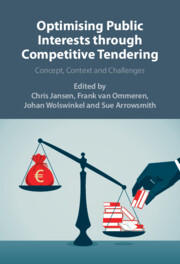Refine search
Actions for selected content:
3 results
1 - Optimising Public Interests through Competitive Tendering
-
-
- Book:
- Optimizing Public Interests through Competitive Tendering
- Published online:
- 11 April 2025
- Print publication:
- 17 April 2025, pp 1-34
-
- Chapter
- Export citation
4 - Subsidising
- from Part I - Characterising Limited Rights
-
-
- Book:
- Optimizing Public Interests through Competitive Tendering
- Published online:
- 11 April 2025
- Print publication:
- 17 April 2025, pp 163-192
-
- Chapter
- Export citation

Optimizing Public Interests through Competitive Tendering
- Concept, Context and Challenges
-
- Published online:
- 11 April 2025
- Print publication:
- 17 April 2025
